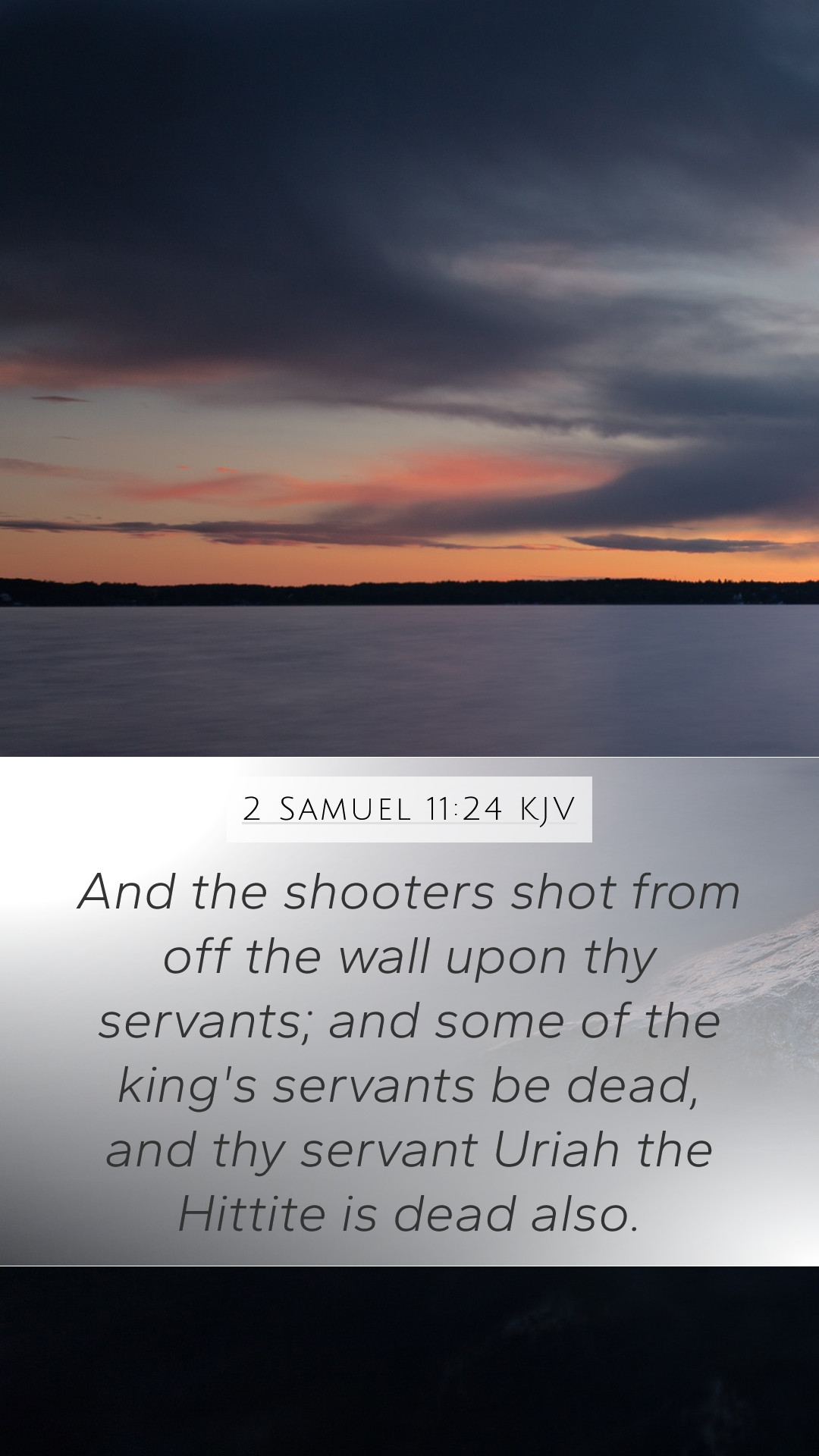Understanding 2 Samuel 11:24
Bible Verse: 2 Samuel 11:24 - "And the shooters shot from off the wall upon thy servants; and some of the king's servants are dead, and thy servant Uriah the Hittite is dead also."
Summary of Context
This verse occurs within a narrative that details a significant event in the life of David, specifically his moral failure involving Bathsheba and the subsequent plot to cover up the sin. Uriah, her husband, is unwittingly caught in a scheme that ultimately leads to his death designed by King David. Understanding this verse requires a look into the historical context, the key characters, and the theological implications of their actions.
Bible Verse Meanings and Interpretations
This passage can be broken down and analyzed through several lenses, drawing upon insights from esteemed public domain commentaries.
-
Matthew Henry:
Henry emphasizes the tragic nature of Uriah's death and the deep sinfulness of David's actions. He reflects on the moral implications of David's strategy, showcasing how sin can lead to further sin, ultimately resulting in devastating consequences not only for the sinner but also for innocent parties.
-
Albert Barnes:
Barnes notes that this incident highlights the ruthlessness of human ambition contrasted against the backdrop of divine justice. He elaborates on the emotional and spiritual ramifications of Uriah's death, asserting that David, in his attempt to cover his sin, resorts to treachery, which is starkly at odds with the values he was meant to uphold as king.
-
Adam Clarke:
Clarke discusses the military strategies employed in the verse, pointing out the fatal decision-making that led to Uriah's demise. He brings attention to the irony of the situation, where a noble warrior is sacrificed for the sake of a king's desire, raising powerful questions about loyalty, justice, and the nature of authority.
Deeper Theological Insights
This verse serves as a sobering reminder of the corrupting nature of sin and the extent to which it can propel individuals to commit further wrongs. David's actions lead not only to personal guilt but also to national turmoil, emphasizing the broader ramifications of personal sin.
Additionally, this narrative underscores God’s disapproval of such deeds, and the eventual consequences of the actions taken against Uriah foreshadow the turmoil that would later befall David's kingdom as a result of his sinning against God and man alike.
Application to Daily Life
When considering the lesson of 2 Samuel 11:24, we are urged to reflect upon our own lives and the potential for moral compromise. This verse cautions against the rationalization of sin and the ways in which our desires can lead us to unjust actions. Recognizing the weight of our decisions helps in aligning our actions with a more ethical and faithful path.
Related Bible Cross References
- 2 Samuel 12:9: This verse highlights God's rebuke to David regarding Uriah's death.
- Psalm 51: David’s psalm of repentance after his sin with Bathsheba, showcasing the need for confession and divine forgiveness.
- Matthew 5:28: Jesus expands on the understanding of sin, emphasizing that lustful intent is akin to the act itself.
Conclusion
In summary, 2 Samuel 11:24 serves as a powerful account of sin, its consequences, and the nature of human frailty. Through various commentaries, we gather insights that help illuminate the deeper moral and spiritual lessons embedded within this narrative. As we engage with this verse, we are beckoned to cultivate a heart of integrity, recognizing that our choices hold weight in both the spiritual and earthly realms.


